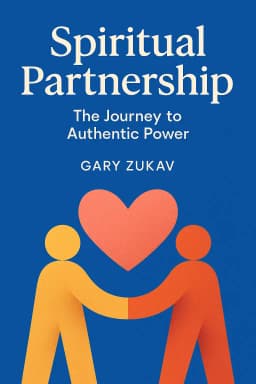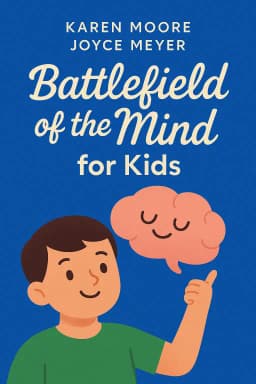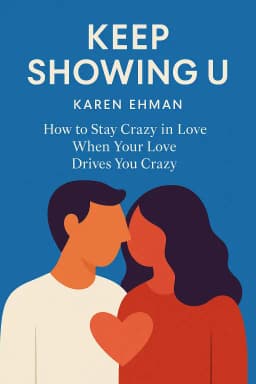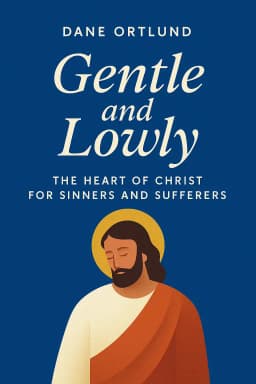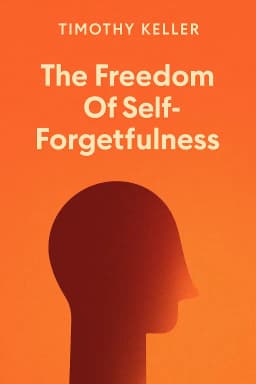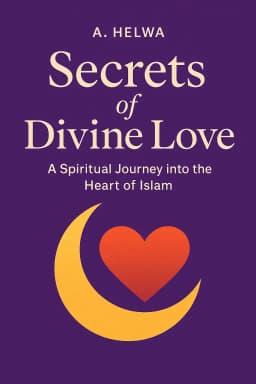
Liars, Cheaters, & God's Grace
Golden Hook & Introduction
SECTION
Daniel: Most of us think of the Book of Genesis as a collection of ancient, maybe even primitive, Sunday school stories. But what if it's actually one of the most sophisticated, morally complex, and psychologically realistic family sagas ever written? A story where the heroes are often liars and cheaters. Sophia: That’s a pretty bold take. We tend to put these figures on a pedestal, but you’re saying the original text paints a much messier, more human picture. I like that. It feels more honest. Daniel: It’s incredibly honest. And that's exactly the argument the Pulitzer Prize-winning novelist Marilynne Robinson makes in her incredible book, Reading Genesis. Sophia: Right, and it's so fascinating that it's a novelist tackling this, not a traditional theologian. She's famous for writing these deeply human, morally complex characters in books like Gilead. It feels like she's applying that same literary lens to the Bible. Daniel: Precisely. She reads it as a unified, coherent literary masterpiece. And that in itself is a direct challenge to the mainstream scholarly view that sees Genesis as a patchwork of different, often contradictory, sources. That’s our entry point today: Genesis as a work of literary and theological genius.
Genesis as a Radical Counter-Story
SECTION
Daniel: So let's start with Robinson's biggest claim: Genesis isn't just telling a story, it's actively arguing with the popular stories of its time. It’s a counter-narrative. Sophia: What do you mean by a 'counter-narrative'? Arguing with what, exactly? Daniel: Arguing with the dominant myths of the Ancient Near East. Think of the blockbusters of that era, like the Epic of Gilgamesh. Robinson’s point is that the authors of Genesis knew these stories and were intentionally writing something radically different. The best example is the Flood. Sophia: Okay, I know the Noah's Ark story. But I don't know the other one. Lay it on me. What happens in the Babylonian version? Daniel: In the Epic of Gilgamesh, there's a very similar flood story. A man named Utnapishtim is told to build a giant boat to survive a flood. But the reason for the flood is completely different. The gods decide to wipe out humanity because… they’re too noisy. Sophia: Wait, seriously? The gods are just annoyed, like cranky upstairs neighbors banging on the floor with a broomstick? Daniel: Exactly. They’re annoyed by the racket. There's no moral dimension to it. The gods are capricious, petty, and frankly, a bit incompetent. They unleash the flood and then get terrified by its power, cowering "like dogs." After the flood, when Utnapishtim makes a sacrifice, the gods swarm around it "like flies" because they're hungry. It’s a very chaotic, amoral universe. Sophia: Wow. Okay, so how does the Genesis version argue with that? Daniel: Genesis takes that familiar story structure and completely transforms its meaning. In Genesis, God isn't annoyed by noise; He is grieved by human wickedness and violence. The decision to send the flood is a moral judgment, not a fit of divine pique. And Noah is saved not because he's a secret favorite, but because he is a "righteous man, blameless in his generation." Sophia: So the whole story gets a moral backbone. It’s about justice, not just power. Daniel: A moral backbone, exactly. And even more importantly, what happens after the flood. In Genesis, God makes a covenant, a promise, symbolized by the rainbow. He promises never again to destroy the earth by water. He establishes a stable, predictable order for the world: "seedtime and harvest, cold and heat, summer and winter, day and night, shall not cease." It’s a promise of stability and grace. There's nothing like that in the Babylonian version. Sophia: But a flood that kills almost everyone still sounds pretty cruel. How does Robinson square that with a 'good' God? That’s a tough one. Daniel: It is. And that’s where Robinson introduces the idea of Genesis as a theodicy. That's a term for an attempt to explain how a good God can exist in a world with so much evil and suffering. She argues that Genesis doesn't try to hide the darkness or pretend it doesn't exist. It confronts it head-on. The text acknowledges the horror of a world-destroying flood but frames it within a context of justice and, ultimately, a promise of enduring grace. It’s a story grappling with the problem of evil, not ignoring it.
The Flawed Heroes & Divine Grace
SECTION
Sophia: That idea of a moral framework is fascinating. But it gets really complicated when you look at the 'heroes' themselves. Which brings me to Jacob. How can a story about righteousness feature a hero who lies to his blind, dying father to steal his brother's inheritance? Daniel: This is one of my favorite parts of Robinson's analysis, because it's so counterintuitive. We expect our biblical heroes to be paragons of virtue. But Robinson argues that the story of Jacob and Esau is a perfect example of how the covenant is not contingent on human perfection. Sophia: It sounds more like a plot from a soap opera! Walk me through it, because the details are just wild. Daniel: They are. You have the elderly, blind Isaac, who wants to give the primary blessing to his favorite son, Esau, the rugged hunter. But his wife, Rebekah, favors the younger son, Jacob. She overhears Isaac's plan and orchestrates this elaborate deception. She cooks a meal, dresses Jacob in Esau's clothes, and even covers his arms and neck with goatskins to mimic his brother's hairy arms. Sophia: Goatskins! That's next-level commitment to a lie. And Jacob just goes along with it? Daniel: He's hesitant! He's afraid he'll be caught and cursed, not blessed. But his mother insists, saying, "Upon me be thy curse, my son." So he does it. He goes in, lies to his father's face, and Isaac, though suspicious—he famously says, "The voice is Jacob’s voice, but the hands are the hands of Esau"—is ultimately fooled and gives Jacob the blessing. Sophia: It feels so… wrong. It’s hard to see the divine plan in an act of cold, calculated deception against a blind old man. Daniel: Exactly! And Robinson says that's the genius of it. The text doesn't whitewash them. It shows them in all their flawed, messy, human glory. God's promise, the covenant, isn't a reward for Jacob's good behavior. It's a constant, a force of grace that works through this deeply dysfunctional family. In a way, Robinson suggests the promise itself is the main character of Genesis, not the people. The people are just the flawed, often-unworthy vessels through which this unbreakable promise is carried. Sophia: So God's plan doesn't need perfect people to work. It works with the people He has, flaws and all. That’s a very different way of looking at it. It’s less about earning God’s favor and more about God’s favor being this relentless force in the world. Daniel: Relentless is the perfect word. The covenant is sustained by the will of God, which is so steadfast that it allows space for people to be who they are. It’s a radical idea of grace. It’s not about finding worthy people; it’s about God’s loyalty to His own creation and His own promises, no matter how much we mess things up.
The Power of Forgiveness: Redeeming Evil into Good
SECTION
Daniel: And this idea of grace working through human messiness finds its ultimate expression at the very end of Genesis, in the story of Joseph. Sophia: Ah, Joseph and the coat of many colors. This is another story of extreme family dysfunction. His brothers hated him so much they sold him into slavery. Daniel: They did. They plotted to kill him, threw him in a pit, and then sold him to passing traders for twenty pieces of silver. Then they dipped his beautiful coat in goat's blood and took it to their father, Jacob, letting him believe his favorite son had been torn apart by a wild animal. It's an act of incredible cruelty. Sophia: So after everything they did to him—selling him into slavery, leaving him for dead, lying to their father for years—they're expecting revenge when they finally meet him again in Egypt, where he's now this powerful ruler. It's the logical human response. Daniel: It is. And the story builds that tension beautifully. After their father Jacob dies, the brothers are terrified. They think, "Now that Dad's gone, Joseph is finally going to get his revenge." They send a message to him, begging for forgiveness, saying, "Please forgive the transgression of the servants of the God of your father." They fall down before him, offering to be his slaves. Sophia: And what does he do? This is the moment of truth. Daniel: This is the moment. And Joseph's response is what Robinson identifies as the interpretive key to the entire book of Genesis. He weeps. And then he says to them, "Fear not... As for you, you meant evil against me; but God meant it unto good, to bring to pass, as it is this day, to save much people alive." Sophia: Wow. "You meant evil against me, but God meant it for good." That’s a powerful line. Daniel: It's everything. Robinson points out that this isn't just a pardon. It's not Joseph simply saying, "I forgive you." It's a complete reframing of reality. He's not denying their evil. He acknowledges it directly. But he sees their malicious act as an instrument in a larger, providential plan of salvation. Their betrayal led him to Egypt, which put him in a position to save the entire region, including their own family, from a devastating famine. Sophia: So he’s able to see a purpose in his own suffering, a purpose that was bigger than their personal conflict. Forgiveness, in this sense, is about seeing the bigger picture. Daniel: Exactly. It's a perception of a higher order, a divine economy where even the most terrible human actions can be woven into a tapestry of grace and redemption. This, for Robinson, is the final, profound statement of Genesis. It fulfills the promise of a good God who is loyal to His creation, who can take the worst of human evil and transform it into an instrument of life.
Synthesis & Takeaways
SECTION
Sophia: So, when you put it all together, Genesis isn't a simple history or a collection of primitive myths. According to Robinson, it's a radical counter-story for its time, a saga of divine grace operating through deeply flawed people, and it all culminates in this profound idea that even the worst human actions can be redeemed into something good by a larger providence. Daniel: Right. And Robinson's point is that this isn't just an ancient idea. It's a way of reading our own lives. It challenges us to look for grace in the midst of chaos and to consider that the story we're in might be bigger than we can see. The book is filled with these moments of what she calls "divine restraint." God could intervene directly at any point—stop Jacob's lie, prevent the brothers' betrayal—but He doesn't. He allows human freedom, with all its terrible potential, because that freedom is essential for a meaningful existence. Sophia: That's a really powerful thought. It means taking human evil seriously, as Joseph did with his brothers, but not giving it the last word. The last word belongs to grace, to redemption. Daniel: Precisely. The book doesn't offer easy answers. It leaves you with the weight of these paradoxes. It's received highly positive but also some challenging reviews, because it doesn't fit neatly into any camp. It's too literary for some theologians and too faithful for some literary critics. But that's its strength. It forces you to think. Sophia: It really makes you wonder... what 'evil' in our own lives or in the world could be part of a larger story of redemption we just can't see yet? A powerful thought to sit with. Daniel: This is Aibrary, signing off.
